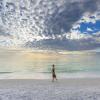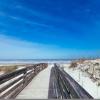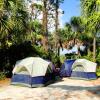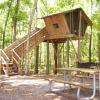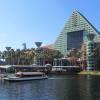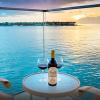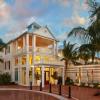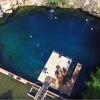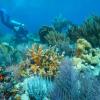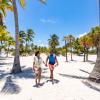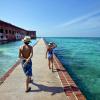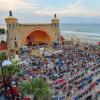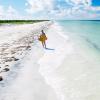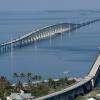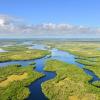By Phil Tatman
Just before summer is a slow time at Pine Log State Forest, a 7,129-acre tract in Northwest Florida’s Bay and Washington counties.
That’s when Warren Allen packs his RV (and two mountain bikes) and heads for state parks and forests all over Florida. Bradenton resident Allen is a 71-year-old retired software engineer and can go wherever he wants, whenever he wants.
"I have been to most of the state parks and I really like Pine Log because it is different,'' said Allen, who was in the middle of a two-night stay at the campground. "It’s peaceful here – quiet, not crowded. I think the boardwalk trail is really nice.''
In agreement is Keith Cullen, the Pine Log forester for the past seven years.
"When that 600-foot boardwalk was built five years ago, it took our two-mile, foot-traffic-only trail away from the road,'' Cullen said. "It’s a pretty walk with the swamp and lots of cypress and pine trees. Wood ducks can often be found under the boardwalk.''
Watching birds is popular at Pine Log, which is part of the Great Florida Birding Trail. In fact, there’s a two-page Pine Log State Forest checklist of birds available from the Florida Forest Service.
"We have many birds here,'' Cullen said. “But I have had people tell me they didn't see a single one out there.''
The forest is known for its purple martins, cardinals, mockingbirds, quail, doves, herons, swifts, chickadees, woodpeckers and several varieties of owls. Ospreys fish the pond. Hawks search for rabbits and mice.
"There are two bald eagles, but neither has a nest here,'' Cullen said." One eagle comes from the south and one comes from the west. The ospreys and eagles dive toward the water and go for the bream and bass we have stocked.''
Pine Log is also home to such ground predators as coyotes and wild hogs.
"If you’re camping here, you need to be aware of them,'' said Cullen, who rents the state-owned house near the park rangers' office. “I can hear a pack of coyotes howling at night. Four years ago, three coyotes broke into my chicken coup and killed 20 hens and a rooster. An electric fence stopped that.
"Sadly, coyotes have eaten young quail and young wild turkeys. Once, they ate the watermelons out of a watermelon patch.''
Wild hogs are just as destructive as coyotes.
"A couple of years ago, we put in about a mile stretch of plants that the turkeys enjoy,'' Cullen said. “The hogs came in one night and destroyed nearly every plant.''
Allen hasn’t had any run-ins with the forest’s wildlife.
"I have been coming to Pine Log every other year for about eight years and I saw a couple of water moccasins once,'' he said. "But usually it’s tranquil here and that’s the way I like it.''
Pine Log's facilities include 20 campsites (all with electricity and water), a boat ramp and a picnic pavilion (available by reservation for a fee). Three primitive campsites are available via reservation only and are limited to five people per site. Primitive Pine Log State Forest camping does not include use of restrooms or showers.
The state forest’s recreational activities include swimming (no lifeguards), fishing, cycling, hiking and horseback riding.
Trails in Pine Log State Forest
- The Campground Loop Trail, which includes the boardwalk, is two miles long.
- The Dutch Tieman Trail is a four-mile trail open to hikers and bicyclists.
- Nine-mile Crooked Creek Trail is intended for bike use, but foot traffic is also welcome.
- The Old Sawmill Trail, 12.5 miles of existing roads, closed roads and old fire breaks, is for horseback riders only.
If you go:
Pine Log State Forest is in northwestern Bay and southwestern Washington counties. It’s 14 miles north of Panama City Beach, with access available at the south entrance on State Road 79 or the north entrance off State Road 20 near Ebro. To find out more, call 850-535-2888 or visit myfwc.com.
